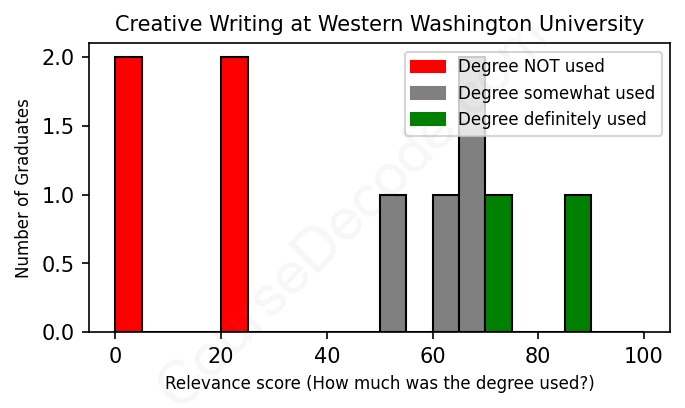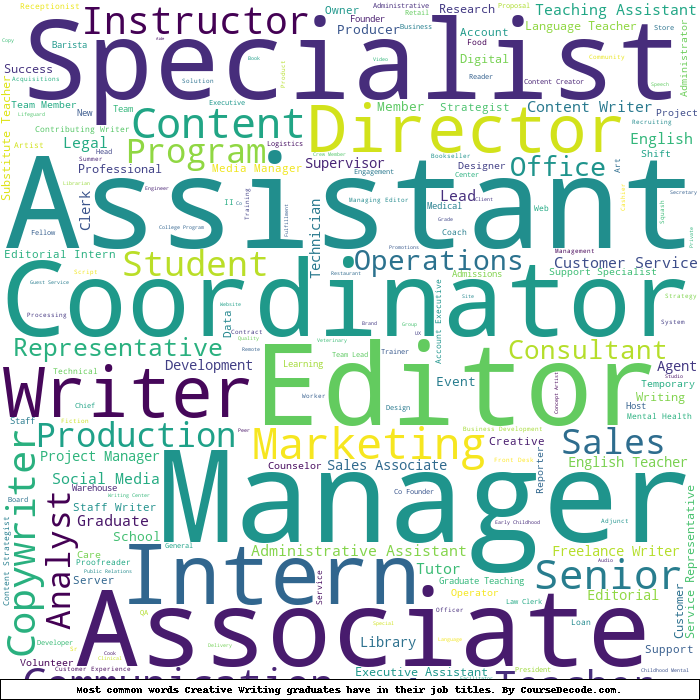
First, some facts. Of the Creative Writing graduates from Western Washington University we've analyzed , here's how many have used (or NOT used) their degree in their career:

These are estimates based on AI analysis of 10 LinkedIn profiles (see below).
The verdict? Bad. Overall, with an average relevance score of 44%, Creative Writing graduates from Western Washington University have a substantially lower likelihood (-23%) of finding work in this field compared to the average graduate across all fields:
And for comparison, here's the chart for all profiles we've looked at across all degrees.
Also, after graduating, 40% of these graduates have pursued further education other than another Bachelor's degree (such as a Masters degree or other), compared to the average across all profiles of 35%. This suggests you may need more than just a Bachelors degree to be competitive as a Creative Writing graduate.
See the details:
|
Relevance score: 50% We think this person has gone into a career only somewhat relevant to their degree. We think this person has gone into a career only somewhat relevant to their degree.
DEGREE INFOGraduated in 2010 from Western Washington University with a Bachelor of Arts - BA in Creative Writing. No other secondary education since. JOB HISTORY SINCE GRADUATIONUGC Evaluator II Nintendo of America Jun 2011 - Dec 2015 ABOUTNo information provided. |
The top 10 most common jobs done by the graduates we've analyzed (ranked most common to least) are:
After analyzing the job placements of graduates from Western Washington University who earned a degree in Creative Writing, it seems there's quite a mix in the types of jobs they've landed. Many of them have taken on roles like copywriters, editors, and content creators, which directly tap into their creative writing skills. Positions like a copywriter at Zerys or an editor at Various publications allow them to utilize the art of storytelling, crafting written content that aligns with their education. However, not all roles are so closely related; quite a few graduates have ended up in fields like food service, administrative positions, or even technical roles, where their creative writing background isn’t very relevant at all. For example, roles like server at a café or optician don’t call for creative writing skills, showing that some graduates might have taken jobs that were more about financial need than aligning with their passions.
Overall, while there are definitely some graduates who have managed to find jobs that are very relevant to their degree, many have taken quite different paths. The common thread seems to be that a fair amount of creativity and communication skills can still be valuable, regardless of the role. The job market can be unpredictable, and sometimes you’ve got to take what you can get, even if it doesn’t perfectly align with what you studied. That said, the mix of roles does suggest that writing skills are in demand in various forms, even if they don’t always manifest as traditional creative writing jobs.
Here is a visual representation of the most common words in job titles for Creative Writing graduates (this is across all Creative Writing graduates we've analyzed, not just those who went to Western Washington University):

Looking at the career paths of graduates from Western Washington University's Creative Writing program, there seems to be a mix of outcomes. For many, the first job after graduating is not directly related to creative writing. For instance, some landed roles in hospitality or as administrative assistants, while others took on editorial or support positions. This initial focus on non-writing jobs might feel disheartening to some students expecting to dive straight into a career in writing or publishing. However, as you look at their experiences five or ten years later, you can see that a number of them have transitioned into more relevant roles in marketing, copywriting, and content creation.
While not everyone has found their way into dream writing jobs right away, several graduates have successfully carved out careers utilizing their writing skills, often pivoting through roles in related fields like marketing and communications. Over the years, some have climbed the career ladder, picking up titles like Senior Copywriter, Director of Production Operations, and even Content Creator for various platforms. Though there are those who may have ventured into unrelated fields like optometry, it’s clear that many alumni find their groove in writing-related positions eventually. So, while the path might start a bit rocky for some, it’s great to see that creative writing graduates can still flourish in roles that value their skills.
Honestly, a Bachelor’s degree in Creative Writing, whether at Western Washington University or elsewhere, can be a bit of a mixed bag in terms of difficulty. It’s not like some hardcore math or science degrees where you’re drowning in formulas and equations; instead, it's more about finding your voice and crafting stories, which can be super rewarding but also really challenging in its own way. You’ll spend a lot of time writing, critiquing, and editing your work, and if you’re the kind of person who loves diving deep into literature and playing with words, you might find it more on the enjoyable side. However, if you struggle with self-expression or taking feedback, it could feel a bit tougher. Overall, it’s probably easier than a lot of STEM degrees, but it definitely requires passion and commitment to really thrive.
Most commonly, in the LinkedIn profiles we've looked at, it takes people 3 years to finish a Bachelor degree in Creative Writing.
So, when you look at the job histories of these Creative Writing grads from Western Washington University, it seems like most of them are still kinda scraping by or juggling lower-paying gigs, especially at the start of their careers. A lot of them started with roles like being a server or even doing internships, which definitely won't make you rich. Some have landed decent positions, especially in copywriting and content creation, which can pay better as they gain experience, but overall, there's a mix of entry-level jobs and freelance stuff that might not be super lucrative. It's clear some have found ways to climb the ladder over time, like moving into higher roles in marketing or production, but it sort of looks like a tough grind to get to that point. If you’re thinking about pursuing something like this, keep in mind it might take a while to find that good-paying job!
Here is a visual representation of the most common words seen in the "about" section of LinkedIn profiles who have a Bachelor degree in Creative Writing (this is across all Creative Writing graduates we've analyzed, not just those who went to Western Washington University). This may or may not be useful:

Here are all colleges offering a Bachelor degree in Creative Writing (ordered by the average relevance score of their Creative Writing graduates, best to worst) where we have analyzed at least 10 of their graduates:
| College | Score | Count |
|---|---|---|
 University of Central Florida University of Central Florida
|
58 | 17 |
 Florida State University Florida State University
|
56 | 15 |
 Columbia College Chicago Columbia College Chicago
|
54 | 10 |
 University of Washington University of Washington
|
53 | 11 |
 University of California, Riverside University of California, Riverside
|
45 | 10 |
 Southern New Hampshire University Southern New Hampshire University
|
44 | 26 |
 Western Washington University Western Washington University
|
44 | 10 |
 Full Sail University Full Sail University
|
21 | 31 |